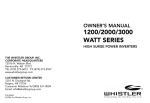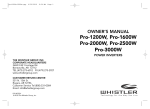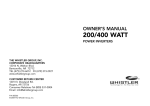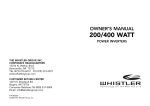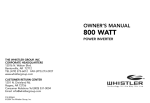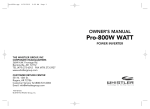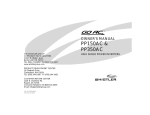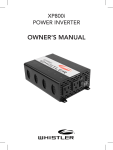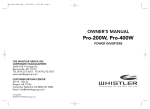Download Whistler 1750 Owner`s manual
Transcript
OWNER’S MANUAL 1200/2000/3000 WATT SERIES HIGH SURGE POWER INVERTERS THE WHISTLER GROUP, INC. CORPORATE HEADQUARTERS 13016 N. Walton Blvd. Bentonville, AR 72712 TEL (479) 273-6012 FX (479) 273-2927 www.whistlergroup.com CUSTOMER RETURN CENTER 1201 N. Dixieland Rd. Rogers, AR 72756 Consumer Relations Tel (800) 531-0004 Email: [email protected] P/N 20562 © 2006 The Whistler Group, Inc. INTRODUCTION If you have questions concerning the operation of this Whistler product please call customer service: 1-800-531-0004 Hours: Monday - Friday 8:00 am - 5:00 pm CT Please keep the receipt in a safe place. You may register your product online at www.whistlergroup.com. If the unit is returned without a dated proof of purchase, an out of warranty service charge applies. Note: Your warranty period begins at the time of purchase. The warranty is validated only by your receipt. Now is the time to record the serial number of the unit in the space provided in the warranty section of the manual. Dear Whistler Owner, For many of us, a vehicle is more than just transportation. It can be a mobile office, communications or entertainment center, or simply an expression of our personality. Whistler products are designed to make the time you spend in your vehicle more productive, more fulfilling, safer, or just simply more fun. Our mission is to provide products that improve your driving experience. Whistler offers a complete line of DC to AC inverters ranging in capacity from 100 Watts to 3000 Watts. These inverters offer advanced technology, dependable operation and will provide years of reliable service when used in accordance with our operating instructions. Your new Whistler power inverter allows you to run most AC appliances right from your car, boat or RV. They’re great for weekend use and life on the road. They’re also great for power outages from 1200 thru 3000 watts. To fully acquaint yourself with the operation of your Whistler power inverter we recommend reading this entire manual. Sincerely, THE WHISTLER GROUP, INC. 1 TABLE OF CONTENTS Topic WHISTLER FEATURES Page Features Summary ..................................................................3-7 Important Information................................................................8 Inverter Information ............................................................9 - 11 • Getting Started • Don’t Push It Battery Information ...........................................................11 - 13 • Selecting the Optimum Power Source Cable Information .............................................................13 - 14 • Wire Cable Gauges Operation ..........................................................................15 - 23 • Making the Connection • Tips • Recharging Equipment • Power Source • TV’s & Microwaves A Word About Whistler Power Inverters Whistler inverters convert low voltage, direct current (DC) to 110 volt alternating household current (AC). The AC output is called “modified sine wave”. See “Technical Operating Principles” section for more information. Depending on the model and its rated capacity, Whistler inverters draw power either from standard 12 volt automobile and marine batteries or from portable high power 12 volt sources. Inverter Feature Technical Operating Principles ........................................23 - 25 Operation Summary .........................................................25 - 27 Troubleshooting ................................................................28 - 29 Specifications............................................................................30 Warranty Information ...............................................................31 1200 watt series shown 2 3 FEATURES FEATURES 2000 watt series shown 4 3000 watt series shown 5 FEATURES FEATURES a). ON/OFF Switch. This switch controls the flow of power from the power source to the inverter. It does not control the power running from the inverter to the equipment or appliance being operated. Voltage Indicator. This LCD display also monitors the voltage being drawn from the battery by the inverter. The voltage is measured at the Negative and Positive power input terminals on the inverter. The voltage level reading may be lower than the battery voltage due to the voltage "drop" that occurs as the battery voltage runs through the terminal connections and cables. b). High Temperature LED Indicator Light. This light will turn RED and the inverter will automatically shut down when the internal temperature exceeds design parameters for safe operation. When this occurs, turn the equipment or appliance off. Overheating may result when the inverter is being operated at levels exceeding its wattage rating or because it has been placed in a location or in an manner which prevents proper heat dissipation. After approximately 15 minutes, the High Temperature Indicator light and the Cooling Fan will turn off and the inverter will automatically restart indicating that the inverter temperature has dropped to a safe operating level. Over Load LED Indicator Light. This light will turn RED and the inverter will automatically shut down when the continuous power draw from the inverter exceeds the maximum continuous power rating for the inverter. Turn the inverter OFF (O), determine and resolve the cause of the overload prior to resuming operation of the equipment or appliance. Turning the inverter ON (I) will reset it. c).Remote Operation Jack. The inverter is designed to be operated from a remote location via the WHISTLER 401009 Remote Control Switch which plugs into this socket. This optional accessory is available through WHISTLER or your WHISTLER dealer. d). Wattage & Voltage Wattage Indicator. This LCD Digital display monitors the DC voltage, AC voltage and wattage at the inverter. When the reading rises above the rated limits, the inverter may automatically shut down. In this event, it is likely that the draw of the equipment or appliance being operated is greater than the battery is capable of producing. 6 The inverter is designed to operate with input voltages ranging from 11 to 15 volts. When the voltage drops below 11 volts DC an audible alarm will sound. If the voltage drops below 11 volts DC, the voltage indicator will go out and the inverter will automatically shut down. The inverter also will shut down automatically when the input voltage exceeds 15 volts DC. Despite this "built in" protection, the inverter may be damaged if the input voltage exceeds 15 volts DC and damage caused by excess voltage input is not covered under the WHISTLER warranty. Note: In the event of automatic shut down or continuous audible alarm, turn the inverter OFF (O) until the source of the related problem has been determined and resolved. e). Standard North American 110 AC Outlets are provided. f). Cooling Fan. This fan will turn on automatically when the unit is turned on. g). Chassis Ground Terminal Lug. h). Power Input Terminals Make note of the proper polarity. i). External Fuse Cover Note: The 3000 watt inverters incorporates all of the operating and safety features of the 1200 and 2000 models. 7 IMPORTANT INFORMATION Important Information About Your New Whistler Inverter. This manual will provide you with directions for the safe and efficient operation of your Whistle Power Inverter. Important Note: Each of the following operating procedures and safety features must be carefully reviewed and thoroughly understood prior to using the inverter. Failure to do so may result in damage to the inverter or equipment or serious personal injury. Notes: Your Whistler inverter is designed to operate from a 12 volt power source only. Never attempt to connect your Whistler inverter to any other power source, including any AC power source. • 110 volts can be lethal. Improper use of your Whistler inverter may result in property damage, personal injury or loss of life. Note: Not recommended for use with medical equipment. • Check with the appliance manufacturer for compatibility with modified sine wave inverters. Some appliances may not work well, not at all or be damaged. This is especially true for medical equipment. For more information on compatibility issues, please visit our inverter FAQ page at: www.whistlergroup.com/faq-inverters.asp INVERTER INFORMATION Getting Started Power equipment and appliances which operate with motors or tubes require an initial surge of power to get them up and running. This power surge is referred to as the "starting load" or "peak load." By comparison, electrical devices such as standard light bulbs do not require a large starting load). Once the equipment or appliance has been powered up, it settles down to a slower pace and requires far less electrical power to operate. This lower power requirement is referred to as the "continuous load." In order to ensure that the capacity of your Whistler inverter is sufficient to meet the required start up load, you must first determine the power consumption of the equipment or appliance you plan to operate. Power consumption is rated either in wattage or in amperes, and information regarding the required "watts" or "amps" generally is stamped or printed on most appliances and equipment. If this information is not indicated on the appliance or equipment, check the owner’s manual. Contact the appliance or equipment manufacturer to determine if the device you are using (TV’s, battery re-charger, computer, etc.) is compatible with a modified sine wave. If the power consumption is rated in amps, multiply the number of amps by 110 (AC voltage) to determine the comparable wattage rating. Induction motors may require 2 to 6 times their wattage rating to start up. For further information on the fundamental operating principles of Whistler inverters and related technical data, see "Technical Operating Principles" 8 9 INVERTER INFORMATION Don’t Push It. Although your Whistler power inverter has the capacity to provide power output (excess current) equal to approximately two times its rated wattage capacity for a very brief period, it is designed to operate equipment and appliances with start up load wattage ratings no higher than its own maximum continuous wattage rating. For example, the 1200 model has a maximum continuous rating of 1200 watts. Although this model has the capacity to briefly provide higher watts of power (that is, excess current), it is designed to operate equipment and appliances with start up load requirements of 1200 watts or less. Consequently, if the start up load rating of your equipment or appliance is the same or approximately the same as the maximum continuous rating of the inverter, the inverter will attempt to start loads above the continuous rating. Some refrigerators, freezers, pumps and other similar equipment and appliances require very high start up loads to operate. Before attempting to power up this type of equipment or appliance, make especially certain that all connections have been properly made and that the power source is fully charged. INVERTER INFORMATION start up load ratings comparable to your inverter wattage rating will not damage it. If a piece of equipment or an appliance will not operate, first confirm that the inverter has been properly connected to the 12 volt power source (See "Making The Connection"). If all connections have been properly made, turn the inverter rocker switch ON (l), OFF (O) and ON (l) again in quick succession. If this procedure is unsuccessful, it is likely that the inverter does not have the required start up capacity or your battery supply isn’t large enough to operate the equipment or appliance in question. Selecting the Optimum Power Source. Operating the inverter for extended periods combined with a high continuous load demand may result in excessive power drain from the battery. Therefore, the reserve capacity of the battery you select to power the inverter is an important consideration. The potential power drain can be estimated by calculating the reserve power ("amp/hour") of the battery and the amps required by the inverter to meet the continuous load demand of the equipment or appliance being operated. To determine whether your inverter will operate a particular piece of equipment or appliance, run a test. The inverter is designed to shut down automatically in the event of a power overload. Testing appliances and equipment with 10 11 BATTERY/CABLE INFORMATION BATTERY INFORMATION 1. 2. To calculate the amp/hour of the battery, first determine its "reserve minutes" rating. (Deep cycle marine batteries generally have the highest reserve minute ratings). This rating typically is marked on the battery along with the "Cold Cranking Amps" (CCA) rating. Multiply the reserve minutes rating of the battery by 0.3 to determine the battery amp/hour rating. A battery with a reserve minutes rating of 166 has an amp/hour. To estimate the maximum battery power the inverter will require to run a piece of equipment or appliance, divide its continuous load wattage requirement by 10. The WHISTLER 1200 watt model utilizes 50 amps of battery power to operate an appliance with a 500 watt continuous load requirement. (500 divided by 10 = 50). 3. Conclusion: The reserve power of the battery is sufficient to satisfy the continuous load demand placed on the inverter for a maximum of about one hour. (49.8 divided by 50 = 1 hour). Note: • When the inverter will be operating equipment or appliances with high continuous load ratings for extended periods, it is not advisable to power the inverter with the same battery used to power your vehicle. If the car or truck battery is utilized for an extended period, it is possible that the battery voltage may be drained to the point where the battery has insufficient reserve power to start the vehicles. 12 • It may be advisable to operate the inverter from a bank of batteries of the same type in a "parallel" configuration. Two such batteries will generate twice the amp/hours of a single battery; three batteries will generate three times the amp/hours and so on. This multiple parallel battery option is especially recommended for the Whistler 3000 inverter due to the high level of amps these models require to produce up to 3000 watts of continuous load. For more information regarding battery power please visit our inverter faq page at www.whistlergroup.com/faq-inverters.asp. Wire Cable Gauges For safe and proper operation of the inverter, connect the inverter to the power source with the thickest wire available and in the shortest length practical. 1200 When the inverter and the battery are set up within four feet of each other, use a minimum of #4 gauge wire to make the connections. Within four to six feet, use a minimum of #2 gauge wire. At distances of more than six feet, use #0 gauge wire. Regardless of the wire gauge selected to make the connections to the battery, we recommend use of an "O Ring 13 OPERATION CABLE INFORMATION Adapter." Use of #0 gauge wire to make the connections to the inverter may require a "0 to 4 Gauge Adapter." Both adapters are available through electronic supply stores including Radio Shack. Radio Shack part number is listed below: O Ring Adapter: 0 to 4 Gauge Adapter: Making the Connection. 1. Make certain that the Power switch is in the OFF (O) position. 2. Connect the cables to the power input terminals at the rear of the inverter and tighten the screws to make a secure connection. Do not use tools to tighten these screws. (To make these connections on the 2000 and 3000, remove the supplied nut at each terminal on the inverter, install the wire connectors flush with the metal backing plates and refasten the nuts securely. Connect the cable from the Negative (-) terminal on the inverter to the Negative (-) terminal on the 12 volt power source. Make certain the connection is secure. Confirm that the cable you have just installed is properly connected. Specifically, make certain that the cable is connected to the Negative (-) terminals on both the inverter and the 12 volt power source. Connect the cable from the Positive (+) terminal on the inverter to the Positive (+) terminal on the power source. RSU11538139 RSU11538667 2000 and 3000 When the inverter and the battery are set up within four feet of each other, use a minimum of #2 gauge wire to make the connections. Within four to six feet, use two #0 gauge wire. At distances of more than six feet, use #0 gauge wires connected in parallel to the battery. 3. 4. 5. 14 15 OPERATION OPERATION • • • 6. Note: Loose connections can result in a severe decrease in voltage which may cause damage to the wires and insulation. Failure to make proper connection between the inverter and the power source will result in reverse polarity. Reverse polarity will blow the internal fuses in the inverter and may cause permanent damage to the inverter. Damage caused by reverse polarity is not covered under the Whistler warranty. Making the connection between the Positive (+) terminals may cause a spark as a result of current flowing to the capacitors in the inverter. This is a normal occurrence. Due to the potential for sparking, however, it is extremely important that both the inverter and the 12 volt battery be well removed from any possible source of flammable fumes or gases.Failure to heed this warning could result in fire or explosion. Run a ground from the Ground Lug Terminal at the rear of the inverter to a proper grounding point using the shortest practical length of 18 AWG wire. Selection of the grounding point will depend on where you are using the inverter. The ground wire may be connected to the chassis of your vehicle or to the grounding system in your boat or to the earth* if you are operating the inverter in a remote location. Before connecting the ground, make certain that the inverter is turned off. Operating the inverter without properly grounding it may result in electrical shock. 7. Turn the inverter ON (I). Check the Meter on the front panel. The Voltage should read between 11 and 14 volts depending on the voltage of the power source. If the reading is not within this range, check the voltage of the power source and the terminal connections on the power source and the inverter to make sure they are secure. 8. Confirm that the equipment or appliance to be operated is turned off. Plug the equipment or appliance into one of the AC receptacles on the front panel of the the inverter. 9. Turn the inverter to the ON (I) position. Turn on the equipment or appliance. Note: • The audible alarm may make a momentary “chirp” when the inverter is turned OFF (O). The same alarm may also sound when the inverter is being connected to or disconnected from the 12 volt power source. Again, this is normal. • The use of an extension cord from the inverter to the appliance or equipment being operated will not significantly decrease the power being generated by the inverter. For best operating results, the extension cord should be no more than 50 feet long. * This ground can’t be the same ground as the AC ground. 16 17 OPERATION • • Check frequently to ensure that the input and output connections are secure. Loose connections may damage the inverter, the power source, or may generate excessive heat. The following precautions apply to the 3000 watt models only. To generate the maximum output, the 3000 watt model should be connected to a power supply which has the capacity to produce up to 300 amps. The loads should be distributed between the two receptacles to ensure that each outlet is producing no more than its maximum 1500 watt output. If more than one piece of equipment or appliance is to be operated at the same time, first turn on the inverter and then turn on each piece of equipment or appliance separately to enable the inverter to produce the required start up loads. Important Information on Battery Chargers Using your inverter to recharge units designed to charge such portable equipment as power tools, flashlights, video cameras and laptop computers may cause damage to the inverter or the charging unit. Check with the appliance manufacturer for compatibility with sine wave inverters if you’re unsure. Although we advise against it, if you attempt to recharge a charging unit, monitor the temperature of the charging unit for approximately 10 minutes. If the charging unit becomes unusually warm, disconnect it from the inverter immediately. 18 OPERATION The Power Source. When the engine is off, most batteries will provide ample power supply to the inverter for one to two hours. The actual length of time is a function of several variables including the age and condition of the battery, the number of batteries and the power demand being placed on it by the equipment being operated with the inverter. If you are using the inverter while the engine is off, we recommend you start the engine every 30 to 60 minutes and let it run for at least 10 minutes to recharge the battery. We also recommend that the device plugged into the inverter be turned off before turning over the engine. Although it is not necessary to turn off the inverter when turning over the engine, the inverter may momentarily cease operation as the battery voltage decreases. When the inverter is not supplying power, and turned on, it draws low amperage from the battery (see specifications). For You Television Fans & Audiophiles. Although the inverter is shielded and filtered to minimize signal interference, some interference with your television picture may be unavoidable, especially with weak signals. However, here are some suggestions that may improve the reception. 1. First, make certain that the television antenna produces a clear signal under normal operating conditions (i.e., at home plugged into a standard 110 AC wall outlet). Also, ensure that the antenna cable is properly shielded and of good quality. 19 OPERATION OPERATION 2. Change the relative positions of the inverter, antenna cables and television power cord. 3. Isolate the television, its power cord and antenna cables from the 12 volt power source by running an extension cord from the inverter to the television set. and typically is referenced on the back of the microwave. If the operating power requirement does not appear on the back of the microwave, check the owner’s manual or contact the manufacturer. Some Powerful Advice. 4. Coil the television power cord and the input cables running from the 12 volt power source to the inverter. Your Whistler inverter will work best when placed on a reasonably flat surface. The floor or wall of your vehicle are good locations. 5. Attach a "Ferrite Data Line Filter" to the television power cord. More than one filter may be required. These filters are available at most electronic supply stores including Radio Shack. (Radio Shack Part Number is 273-105). When driving with the inverter in operation, make certain that neither the inverter nor the power cords will impede safe operation of your vehicle. Keep the unit and all cords clear of the steering wheel, gas, brake and clutch pedals and gear shift. Note: Inexpensive sound systems may emit a "buzzing" sound when operated with the inverter. This is due to inadequate filters in the sound system. There is no solution to his problem short of purchasing a sound system with a higher quality power supply. To maintain your inverter in proper working condition, note the following important safety precautions: • MOISTURE. Keep the inverter dry. Do not expose it to moisture. Do not operate the inverter if you, the inverter, the device being operated or any other surfaces that may come in contact with any power sources are wet. Water and many other liquids can conduct electricity which may lead to serious injury or death. • HEAT. For peak efficiency, the ambient air temperature should be between 50° and 80° F. Avoid placing the inverter on or near heating vents, For You Microwave Chefs. The power rating commonly associated with microwave ovens is the "cooking power" which is the power being "delivered" to the item being microwaved. The actual operating power requirement rating is higher than the cooking power rating 20 21 OPERATION OPERATING PRINCIPALS radiators or other sources of heat. Do not place the inverter in direct sunlight. • • 145 volts peak 115 volts RMS VENTILATION. In order to disperse the heat generated while the inverter is in operation, keep it well ventilated. While in use, maintain several inches of clearance around the top and sides of the inverter. FUMES & GASES. Avoid using the inverter near flammable materials. Do not place the inverter in areas such as battery compartments, where fumes or gases may accumulate. For You Technical Types. 1. Basic Operating Principles: Whistler inverters work in two stages. During the first stage, the DC to DC converter increases the DC input voltage from the power source (e.g. a 12 volt battery) to 145 volts DC. In the second stage, the high voltage DC is converted to 110 volts (60 Hz AC) using advanced power MOSFET transistors in a full bridge configuration. The result is excellent overload capability and the capacity to operate difficult reactive loads. The output waveform resulting from these conversions is a "quasi-sine wave" or a "modified sine wave" as shown on the following page. 0 The modified sine wave produced by your Whistler Inverter The modified sine wave produced by your Whistler inverter has a root mean square (RMS) voltage of 110 volts. The majority of AC voltmeters are calibrated for RMS voltage and assume that the measured waveform will be a pure sine wave. Consequently, these meters will not read the RMS modified sine wave voltage correctly and, when measuring your Whistler inverter output, the meters will read about 20 to 30 volts too low. To accurately measure the output voltage of your inverter, use a true RMS reading voltmeter such as a Fluke 87, Fluke 8060A, Beckman 4410, Triplett 4200 or any multimeter identified as "True RMS." For more information on inverters see our Inverter FAQ page at www.whistlergroup.com/faq-inverters.asp This stepped waveform is similar to the power generated by utilities and has a broad range of applications. 22 23 OPERATING PRINCIPALS/SUMMARY A true sine wave typical of home AC outlet. In Review. • Never attempt to operate your Whistler inverter from any power source other than a 12 volt battery or a group of batteries that total 12 volts. • Always make certain that the power cable terminal connections run Negative (-) to Negative (-) and Positive (+) to Positive (+). Check these connections frequently to ensure that they are secure. Make certain the rated power consumption of the appliance or equipment you wish to operate is compatible with the capacity of your inverter. • • If the rated power consumption of the equipment is in the range of the maximum specified wattage of your converter, test the inverter to ensure that it will operate properly. 24 OPERATION SUMMARY • Before attempting to use a battery charger see page 19. • Before attempting to use medical equipment see page 8. • Use the heaviest gauge wire (smaller the number, the larger or heavier the cable) available to connect the inverter to the power source. • When operating the inverter with the engine off, start the engine every 30 to 60 minutes and let it run for at least 10 minutes to recharge the battery. • In the event of automatic shut down, turn the inverter OFF (O) immediately. Do not restart the inverter until the source of the problem has been identified and corrected. • To avoid battery drain always disconnect the inverter when the vehicle is not in use for long periods. • Do not expose the inverter to moisture. • Avoid placing the inverter near sources of heat or in direct sunlight. • When in use, make certain that the inverter is properly ventilated. • Do not use the inverter near flammable materials, fumes, or gases. 25 OPERATION SUMMARY TROUBLESHOOTING PROBLEM: TV Interference • Always operate the inverter in accordance with the instructions in this manual. Failure to do so may result in property damage, personal injury, or loss of life. • While connecting the inverter to the power source, make certain that the inverter is well removed from any potential source of flammable fumes or gases. • Always ground the inverter before operating it. • In the event a continuous audible alarm or automatic shut off, turn the inverter OFF immediately. Do not restart the inverter until the source of the problem has been identified and corrected. Problem Solution Electrical interference from filter inverter. Add a Ferrite data line on to the TV power cord. This filter is available at RadioShack, or other electronic supply stores. part number 273-105. PROBLEM: Low or No Output Voltage Problem Solution Using incorrect type of Use true RMS reading meter voltmeter to test output See "For You Technical voltage. Types" Section of this manual. PROBLEM: Low Battery Alarm On All The Time Problem Solution Input voltage below Keep input voltage above 11 volts. 11 volts to maintain regulation. Poor or weak battery Replace battery. condition. Inadequate power being Use lower gauge wire. See delivered to the inverter “Wire Cable Gauges” or excessive voltage drop. section of this manual. Keep wire length as short as possible. 26 27 TROUBLESHOOTING Overload or High Temp LED on Problem Equipment has a high start up surge. Battery voltage below 10 volts. Equipment being operated draws too much power. Inverter is too hot (thermal shutdown mode). Solution Turn inverter power switch OFF (O) and then ON (l) again until the inverter powers your appliance. Repeat as necessary to get your appliance "started". Recharge or replace battery. Use a higher capacity inverter or do not use this equipment. Allow inverter to cool. Check for adequate ventilation. Reduce the load on the inverter to rated continuous power output. SPECIFICATION WHISTLER 1200 WATT INVERTER SPECIFICATIONS Maximum Continuous Power……………………………1200 Watts Maximum Surge Capability (Peak Power).....................2400 Watts** No Load Current Draw………………………………...............< 1.3A Waveform……………………………….............Modified Sine Wave Operating Input Voltage Range…………….....11-15+0.5 Volts DC AC Receptacle……………………..............Dual 3 Prong Grounded Approximate Dimensions........................ 11.3” L x 5.9” W x 2.7” H Approximate Weight………………...................……………..4.2 lbs WHISTLER 2000 WATT INVERTER SPECIFICATIONS Maximum Continuous Power…………........................…2000 Watts Maximum Surge Capability (Peak Power).................... 4000 Watts** No Load Current Draw…………………………...............…....< 2.0A Waveform…………………………...............…..Modified Sine Wave Operating Input Voltage Range………….........11-15+0.5 Volts DC AC Receptacle…………………..................Dual 3 Prong Grounded Approximate Dimensions….....................13.5” L x 8.7” W x 3.4” H Approximate Weight………………..............……………….9.0 lbs WHISTLER 3000 WATT INVERTER SPECIFICATIONS Maximum Continuous Power……………........................3000 Watts Maximum Surge Capability (Peak Power).....................6000 Watts** No Load Current Draw……………………………...............…< 3.0A Waveform…………………………….................Modified Sine Wave Operating Input Voltage Range………….....…11-15+0.5 Volts DC AC Receptacle…………….4 x 110V/120V AC (3 Prong Grounded) Approximate Dimensions……................ 15.2” L x 9.3” W x 6.3” H Approximate Weight……………………....……………..........14.9 lb *Under certain conditions your inverter may provide up to 2 times the continuous rating for a brief period. 28 29 WARRANTY WARRANTY Consumer Warranty The Whistler 1200/2000/3000 series inverters are warrantied to the original purchaser for a period of (2) two years, from the date of original purchase, against all defects in materials and workmanship. This limited warranty is void if the unit is abused, modified, installed improperly, had its housing removed, or has a missing serial number. There are no express warranties covering this product other than those set forth in this warranty. All express or implied warranties for this product are limited to (2) two years. Whistler is not liable for damages arising from the use, misuse, or operation of this product. IMPORTANT: Whistler will not assume responsibility for loss or damage incurred in shipping. Therefore, please ship your inverter insured with return receipt requested. Service Under Warranty During the warranty period, defective units will be repaired or replaced (with the same or a comparable model), at Whistler’s option, without charge to the purchaser when returned with a dated store receipt to the address below. Inverters returned without a dated store receipt will be handled as described in section “Service Out Of Warranty.” When returning a unit for service under warranty, please follow these instructions: 1. Ship the inverter in the original carton or in a suitable sturdy equivalent, fully insured, with return receipt requested, and shipping charges prepaid to: Whistler Repair Dept. 1201 North Dixieland Road Rogers, AR. 72756 Please allow 3 weeks for return. 30 2. Include with your unit the following information, clearly printed: • Your name and street address (for shipping via UPS), a daytime telephone number, (No P.O. Box please) and e-mail address (if applicable). • A detailed description of the problem, i.e. Unit powers up but no AC output. • A copy of your dated store receipt or bill of sale. 3. Be certain your inverter is returned with its serial number. For reference, please write your unit’s serial number in the following space: s/n __________________. Inverters without serial numbers are not covered under warranty. IMPORTANT: To validate that your inverter is within the warranty period, make sure you keep a copy of your dated store receipt! You may register your warranty online at www.whistlergroup.com, however, for warranty verification purposes, a copy of your dated store receipt must accompany any unit sent in for warranty work. Service Out Of Warranty Inverters will be repaired at “out of warranty” service rates when: • The unit’s original warranty has expired. • Dated store receipt is not supplied. • The unit has been returned without its serial number. • The unit has been abused, modified, installed improperly, or had its housing removed. 31 WARRANTY MEMO The out of warranty service fee for your 1200 Whistler inverter is $90.00, 2000 Whistler inverter is $150.00 and 3000 Whistler inverter is $250.00. If you require out of warranty service, please return your inverter as outlined in the section “Service Under Warranty” along with a certified check or money order for the correct amount. Payment may also be made by MasterCard, VISA or American Express; personal checks are not accepted. In the event repairs cannot be covered by the service fee, you will be contacted by a Whistler technical service specialist who will outline options available to you. If you elect not to have your inverter repaired/replaced, it will be returned to you along with your certified check or money order. IMPORTANT: When returning your inverter for service, be certain to include a daytime telephone number and email address (if applicable). Customer Service If you have questions concerning the operation of your Whistler inverter, or require service during or after the warranty period, please call Customer Service at 1-800-531-0004. Representatives are available to answer your questions Monday - Friday from 8:00 a.m. to 5:00 p.m. (CT). 32 33


















